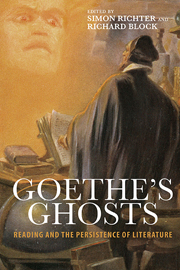Book contents
- Frontmatter
- Contents
- Introduction—Ghosts and the Machine: Reading with Jane Brown
- Part I The Ghosts of Goethe's Past
- Part II The Ghost That Keeps on Giving
- Part III Spirited Encounters
- 11 The Imagination of Freedom: Goethe and Hegel as Contemporaries
- 12 Effacement vs. Exposure of the Poetic Act: Philosophy and Literature as Producers of “History” (Hegel vs. Goethe)
- 13 Toward an Environmental Aesthetics: Depicting Nature in the Age of Goethe
- 14 “Ein heimlich Ding”: The Self as Object in Annette von Droste-Hülshoff
- 15 “Ja, Goethe über alles und immer!”: Benn's “Double Life” in His Letters to F. W. Oelze (1932–56)
- Bibliography of Jane K. Brown's Publications
- Notes on the Contributors
- Index
12 - Effacement vs. Exposure of the Poetic Act: Philosophy and Literature as Producers of “History” (Hegel vs. Goethe)
from Part III - Spirited Encounters
Published online by Cambridge University Press: 05 March 2014
- Frontmatter
- Contents
- Introduction—Ghosts and the Machine: Reading with Jane Brown
- Part I The Ghosts of Goethe's Past
- Part II The Ghost That Keeps on Giving
- Part III Spirited Encounters
- 11 The Imagination of Freedom: Goethe and Hegel as Contemporaries
- 12 Effacement vs. Exposure of the Poetic Act: Philosophy and Literature as Producers of “History” (Hegel vs. Goethe)
- 13 Toward an Environmental Aesthetics: Depicting Nature in the Age of Goethe
- 14 “Ein heimlich Ding”: The Self as Object in Annette von Droste-Hülshoff
- 15 “Ja, Goethe über alles und immer!”: Benn's “Double Life” in His Letters to F. W. Oelze (1932–56)
- Bibliography of Jane K. Brown's Publications
- Notes on the Contributors
- Index
Summary
Es wird unmöglich sein, aus dem Modernismus von Hegels Diagnose neuerer Kunst die Prognose von deren Zukunft zu tilgen, ohne seine Theorie insgesamt umzuformulieren. An ihre Leistungen kann nur der anknüpfen, der die Bedingungen erkennt, unter denen ihre Defekte zustande kamen. Und seiner Fundamente kann man sich nur bedienen, wenn man erkennt, auf welchen Grund sie gelegt sind.
[It will be impossible to cut away the aspect of Hegel's forecast about the future of art from the general modernity of his diagnosis of recent art without reformulating his theory of art as a whole. Only one who knows the conditions under which its defects arose can begin this task of reformulation; one can make use of its foundations only when one understands the grounds on which the foundations were laid.]
I.
“History” is a paradigm that emerges from what the conceptual historian Reinhart Koselleck calls the Sattelzeit, the period between 1750 and 1850; in other words, the concept of history itself has a history. For although history “als Kunde, Erzählung und Wissenschaft” (in the form of tidings, storytelling and scientific inquiry), as he explains, has been “ein alter Befund europäischer Kultur” (a part of European culture since antiquity), and although “das Geschichten-Erzählen zur Geselligkeit des Menschen [gehört]” (the telling of stories is inseparably bound up with human sociability), the notion that “es in der Geschichte um ‘Geschichte selber’ geht und nicht um eine Geschichte von etwas” (what is at stake in history is “history itself,” and not the history of something or other), is “eine moderne, eine neuzeitliche Formulierung” (a formulation specific to the modern era).
- Type
- Chapter
- Information
- Goethe's GhostsReading and the Persistence of Literature, pp. 239 - 261Publisher: Boydell & BrewerPrint publication year: 2013



